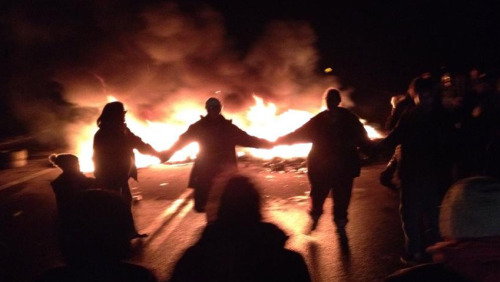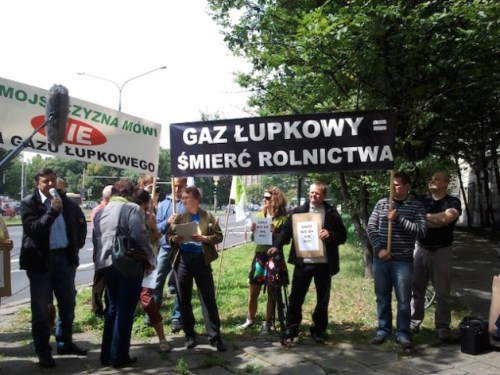By Jorge Barrera, APTN National News
ELSIPOGTOG FIRST NATION–The Mi’kmaq-led opposition to shale gas exploration in New Brunswick continued to regroup Monday, moving into a new phase which could also bring new leadership to the ongoing struggle.
The movement was buoyed Monday afternoon after a Court of Queen’s Bench judge ruled against a Houston-based energy company that was seeking an indefinite injunction against an encampment along Route 134 in Rexton, NB.
The judge said the injunction was no longer needed because trucks belonging to SWN Resources Canada had been freed following an RCMP raid on the encampment Thursday.
The encampment had been blocking the company’s trucks in a compound. The RCMP acted last Thursday, one day before an interim injunction was set to expire, sweeping onto the site with dogs and camouflaged tactical units, arresting 40 people and seizing three rifles, ammunition and crude explosive devices.
At a press conference Monday morning, Elsipogtog Chief Aaron Sock said he is planning on appointing new leadership for the band’s role in the shale gas exploration opposition. Elsipogotog has been at the heart of the protest movement which has been raging since the summer.
“I have three people in mind right now, but we have yet to sit down and discuss,” said Sock. “I do have a spiritual advisor that I turn to and he will be part of the process.”
While Sock wouldn’t give details about the “logistics” of the next phase, it has emerged that there are discussions underway to move the encampment from its current location on Route 134 to a previous base within Elsipogtog’s territory used this past summer which sits just off Hwy 116.
“We are planning on going to the 116 where the sacred fire was before and do our healing there and get ready for the next round,” said Elsipogtog’s War Chief John Levi.
Levi is not connected to the Mi’kmaq Warrior Society.
Levi said there is no longer any point to the Route 134 encampment after the raid freed the exploration trucks it was blocking.
“There is no sense to being on the side of the road, it’s only a danger for our people,” said Levi.
Levi was in talks with the RCMP to remove the burned-out remains of several RCMP vehicles that were torched in the aftermath of Thursday’s raid. He wanted the RCMP to ground their surveillance plane, which had been circling the community, before releasing the vehicles.
On Sunday night, Sock and three friends removed the charred remains using three shovels, a half-ton truck and a local towing company. Sock said an RCMP sergeant was also involved in the removal.
“I took it on my own personally, just being a good neighbour to the people of Rexton, NB.,” said Sock.
The RCMP plane, which had been circling the area relentlessly, returned Monday.
The Mi’kmaq Warrior Society was essentially in charge of the camp at the time of the raid. It remained unclear what role the society will play once new leadership is appointed.
Mi’kmaq Warrior War Chief “Seven,” who was arrested during the raid but has since been freed, said he had no comment and would wait to hear more information.
The Warrior Society has widespread support within Elsipogtog. Several of their key players remained in jail awaiting bail hearings scheduled for Tuesday and Wednesday.
Some at the site said they do not want to move the encampment from Route 134.
Louis Jerome, from Gesgapegiag First Nation in Quebec, said the current encampment is better strategically because it sits near Hwy 11 which passes over Route 134. The encampment is about 15 kilometres northeast of Elsipogtog and 80 km north of Moncton.
Over 100 Mi’kmaq and supporters blocked Hwy 11 for about an hour Saturday. Hwy 11 is one of the main highways in the province, running from Moncton north to Bathurst.
“We are going to stay here,” said Jerome. “This is a place where we can battle…We can see traffic, what is going through.”
Jerome said the plan is to move the encampment a few metres east from the current site to a field on an adjacent road where a teepee currently sits.
Route 134 was again reduced to one lane by the Mi’kmaq Monday evening.
Others said it didn’t matter where the camp was, as long as people were unified. Hubert Francis, from Elsipogtog, said confusion abounded following the raid.
“I am hearing three or four different stories, from three or four different sources,” said Francis. “From day one there has been a lot of miscommunication…We really don’t have a direction on where we are going with this.”
While Sock and the grassroots continue to sort out next steps on the ground, the Elsipogtog chief also has to prepare to continue talks with the provincial government.
“I don’t think this is any longer between Elsipogtog and SWN. This is between Elsipogtog and the province,” said Sock. “That is where the battle is.”
Sock met with New Brunswick Premier David Alward Friday and, while the two had been making progress before the raid, Thursday’s events changed the landscape.
“When you have two opposing ideas, you just butt heads,” said Sock. “Right now we just don’t see eye to eye.”
Sock said Elsipogtog doesn’t want shale gas exploration while the province sees it as a “money maker.” The chief said the Mi’kmaq see no benefit to the province developing shale gas deposits through fracking, or hydraulic fracturing.
“We don’t want to be the ones at the end of the day, 50 or 60 years down the road, which is the average life span of a shale gas well, to be stuck with thousands of wells,” said Sock. “The province will have made their money and we are stuck with the refuse, the garbage.”




